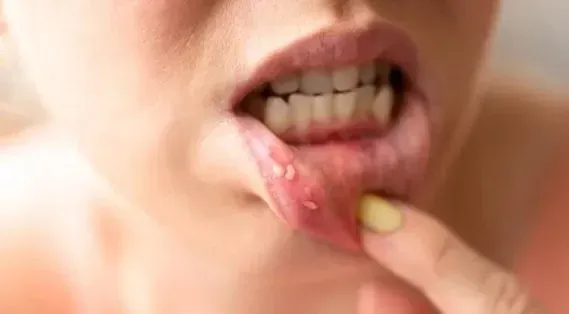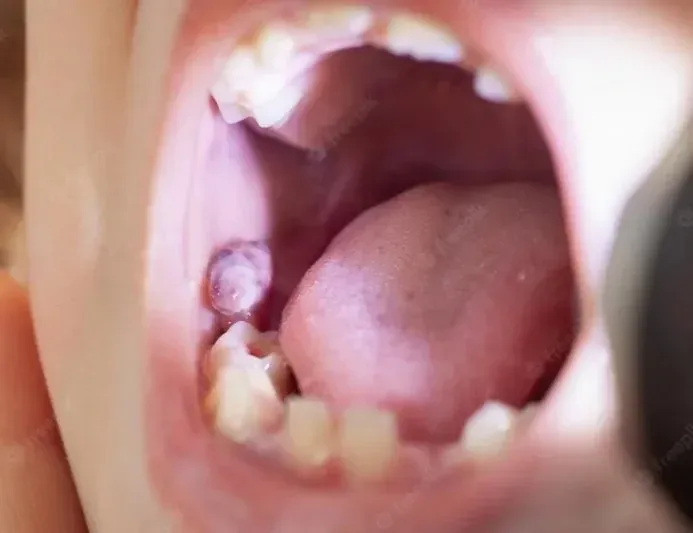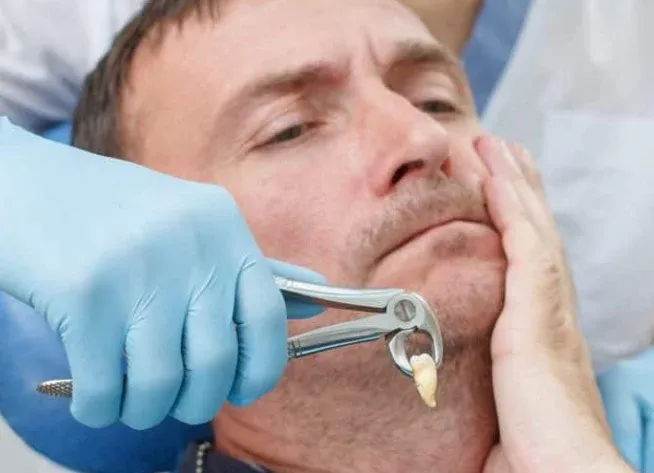Multiple Canker Sores at Once: Causes, Treatment & Relief in 2026
If you’ve ever experienced multiple canker sores at once, you know how frustrating and painful they…
If you’ve ever experienced multiple canker sores at once, you know how frustrating and painful they can be. These small, uncomfortable ulcers—medically known as aphthous ulcers—can make eating, drinking, and even talking a challenge. The good news? While they’re annoying, most canker sores heal on their own within one to two weeks, and there are several effective ways to speed up relief in 2026.
In this comprehensive guide, we’ll explore what causes multiple canker sores to appear simultaneously, how to treat them quickly, and when recurring sores might signal a deeper health issue that needs attention.
What Are Canker Sores?
Canker sores are small, painful ulcers that develop inside the mouth—typically on the tongue, gums, inner cheeks, or soft palate. Unlike cold sores, which appear on the outside of the lips and are caused by the herpes virus, canker sores are not contagious and occur only inside the mouth.
These sores usually appear round or oval, with a white, yellow, or grayish center surrounded by a red, inflamed border. They can range from minor (less than 1 cm) to major (larger than 1 cm), and in some cases, you may develop clusters of tiny sores called herpetiform canker sores.
Why it helps: This alcohol-free rinse soothes canker sores and promotes faster healing by cleansing the affected area.
Why Do Multiple Canker Sores Appear at Once?
Experiencing several canker sores simultaneously can be particularly distressing. While the exact cause of canker sores remains somewhat mysterious, researchers have identified several factors that can trigger outbreaks—especially multiple sores at the same time:
1. High Stress Levels
Stress is one of the most common triggers for canker sore outbreaks. When you’re under significant stress, your immune system weakens, making you more susceptible to developing multiple sores. If you’re dealing with extreme tooth pain that’s keeping you awake, the added stress can create a vicious cycle.
2. Hormonal Changes
Many women notice canker sores appearing during certain phases of their menstrual cycle, pregnancy, or menopause. Hormonal fluctuations can make the mouth’s soft tissues more vulnerable to ulceration.
3. Mouth Injuries
Accidentally biting your cheek, aggressive tooth brushing, dental work, or ill-fitting dentures can all cause trauma that leads to canker sores. Multiple injuries in a short period can result in several sores developing at once.
4. Food Sensitivities
Certain foods are notorious canker sore triggers, including:
- Acidic fruits (citrus, tomatoes, pineapple)
- Spicy foods
- Chocolate
- Coffee
- Nuts
- Strawberries
5. Nutritional Deficiencies
Deficiencies in vitamin B-12, zinc, folic acid, or iron can increase your susceptibility to canker sores. If you’re experiencing teeth breaking into pieces, nutritional deficiencies might be affecting your overall oral health.
6. Medical Conditions
Certain health conditions make you more prone to developing multiple canker sores:
- Celiac disease
- Inflammatory bowel diseases (Crohn’s disease, ulcerative colitis)
- Behçet’s disease
- HIV/AIDS
- Lupus
7. Genetic Predisposition
If your parents or siblings frequently get canker sores, you’re more likely to experience them as well. Some people are simply genetically predisposed to developing these ulcers.
8. Medications
Certain medications can trigger canker sores as a side effect, including:
- Nonsteroidal anti-inflammatory drugs (NSAIDs)
- Beta-blockers
- Chemotherapy drugs
- Some antibiotics
How to Get Rid of Canker Sores Quickly in 2026
While it’s unrealistic to expect canker sores to disappear completely in 24 hours, there are several evidence-based strategies that can significantly reduce pain and accelerate healing:
Saltwater Rinses
Mix one teaspoon of salt in a cup of warm water and rinse your mouth for 30 seconds, three to four times daily. This simple remedy reduces inflammation and creates an environment that promotes healing.
Topical Treatments
Over-the-counter products containing benzocaine (like Orajel or Anbesol) provide temporary numbing relief. For more persistent sores, your dentist might prescribe stronger topical corticosteroids.
Why it helps: This fast-acting liquid creates a protective barrier over canker sores while delivering powerful pain relief.
Baking Soda Paste
Create a paste by mixing baking soda with a small amount of water. Apply it directly to the sores to neutralize acids and reduce inflammation.
Hydrogen Peroxide Rinse
Mix equal parts hydrogen peroxide (3% solution) and water. Dab it on the sores with a cotton swab or use it as a mouth rinse. This helps disinfect the area and promotes faster healing.
Avoid Trigger Foods
Stay away from spicy, acidic, or rough-textured foods until the sores heal. Stick to soft, bland foods like yogurt, mashed potatoes, and smoothies.
Pain Management
Over-the-counter pain relievers like ibuprofen or acetaminophen can help manage discomfort. If you’re wondering about the best painkiller for tooth nerve pain, these same medications can help with canker sore pain as well.
Milk of Magnesia
Dabbing milk of magnesia directly on canker sores several times a day can coat them and provide relief while promoting healing.
Vitamin B-12 Supplements
If you’re deficient in B-12, supplementation may reduce the frequency and severity of canker sore outbreaks. Consult with your healthcare provider before starting any new supplement regimen.
When Multiple Canker Sores Signal Something More Serious
While occasional canker sores are normal, frequent or severe outbreaks—especially multiple sores appearing at once—may indicate an underlying health condition that requires medical attention.
Chronic Canker Sores and Autoimmune Conditions
If you experience canker sores that recur frequently (more than three times per year) or take longer than three weeks to heal, you may have an underlying autoimmune condition:
Behçet’s Disease
This rare autoimmune disorder causes inflammation throughout the body, including recurrent mouth ulcers. Other symptoms include genital sores, eye inflammation, and skin lesions.
Celiac Disease
People with celiac disease—an autoimmune reaction to gluten—often experience recurrent canker sores along with digestive symptoms. If you have unexplained canker sores, consider getting tested for celiac disease.
Crohn’s Disease
This inflammatory bowel disease can cause mouth ulcers in addition to gastrointestinal symptoms. Canker sores may be one of the first signs of Crohn’s disease.
Lupus
Systemic lupus erythematosus (SLE) can cause oral ulcers as part of its wide-ranging effects on the body. These sores may appear different from typical canker sores and are usually painless.
Why it helps: B-12 deficiency is linked to recurrent canker sores, and this fast-absorbing sublingual formula helps maintain healthy oral tissues.
When to See a Dentist or Doctor
Schedule an appointment with a healthcare professional if you experience:
- Canker sores larger than 1 cm in diameter
- Sores that last longer than three weeks
- Extreme pain that isn’t relieved by over-the-counter treatments
- Difficulty eating or drinking due to the pain
- High fever accompanying the sores
- Frequent outbreaks (more than three times per year)
- Sores that extend to your lips
Your dentist or doctor can perform a thorough examination, possibly order blood tests to check for nutritional deficiencies or autoimmune markers, and prescribe stronger medications if needed.
Prevention Strategies for 2026
While you can’t always prevent canker sores, these strategies can reduce your risk of developing multiple sores at once:
Practice Excellent Oral Hygiene
Brush gently with a soft-bristled toothbrush and use a toothpaste free of sodium lauryl sulfate (SLS), which can irritate sensitive mouth tissues.
Manage Stress
Incorporate stress-reduction techniques like meditation, yoga, regular exercise, or deep breathing exercises into your daily routine.
Maintain a Balanced Diet
Ensure you’re getting adequate vitamins and minerals, especially B vitamins, iron, and zinc. Consider a multivitamin if your diet is lacking.
Identify and Avoid Triggers
Keep a food diary to identify which foods trigger your canker sores, then eliminate or reduce them from your diet.
Protect Your Mouth
If you have braces or sharp dental work, use dental wax to protect the soft tissues of your mouth from injury.
Stay Hydrated
Drinking plenty of water keeps your mouth moist and helps wash away irritants that might trigger canker sores.
The Bottom Line
Multiple canker sores at once can be painful and disruptive, but they’re usually harmless and will heal on their own within one to two weeks. By understanding the triggers—whether stress, nutritional deficiencies, food sensitivities, or underlying health conditions—you can take steps to reduce their frequency and severity.
If you’re experiencing frequent outbreaks or sores that don’t heal properly, don’t hesitate to seek professional evaluation. What seems like a simple canker sore problem might be a sign of an underlying condition that needs treatment. With the right approach, you can minimize the impact of canker sores on your daily life and maintain optimal oral health in 2026.
Remember, while home remedies can provide significant relief, persistent or severe cases warrant professional attention. Your oral health is an important part of your overall well-being, and addressing recurring canker sores can improve both your comfort and quality of life.







